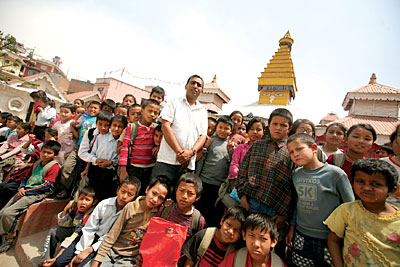 KIRAN PANDAY |
The favourite Nepali pastime is sitting around trying to find nasty things to say about each other. But what is it in our collective psyche that we just can't bear to see fellow Nepalis get ahead?
We overlook the visible faults in ourselves but spend endless hours digging out the imagined shortcomings of fellow citizens. And since our rulers spend their entire time running each other down, we in the media treat this spectacle as one endless quarrel. There can't be civilised disagreement on issues, the basis of potential compromise, because positions are unbending and personalised.
This obsession with finding fault is self-perpetuating and self-fulfilling. This refusal to see any goodness in our own kind makes it difficult to forge ahead. We love to whine but don't ever want to do anything about bettering our condition. It's as if we want Nepal to fail so that our own catastrophic predictions about its fate will be proven right. We don't want Nepal to turn the corner because that would undermine the reason we use to convince ourselves to do nothing, or emigrate.
Despite their desperation and despair, rural Nepalis still have faith in the future, they still have hope. It is their resilience and the Nepali reliance on each other and their communities that has allowed them to survive and keep a positive outlook, something rare in the denizens of this pampered capital.
Let's face it, it's not original any more to complain about how bad things are. Load-shedding is here to stay. There is nothing new about the garbage piling up on the streets. Corruption is not new. The energy crisis, political instability, strikes, pollution and grime are all givens. You can complain, but you will be predictable and boring.
The real question is: what are we doing as individuals and communities to make things better? We have plenty of examples of successful people here who have done well for the underprivileged, overcoming what seemed to be insurmountable obstacles. Take the Chhetrapati Free Clinic or the Samata School (pic), for instance. There are many Nepalis who contribute to improving lives of citizens just by being honest, efficient and aware of the larger public good in their everyday lives.
Let's invest more energy in making ourselves proud to be Nepali. Individually and collectively let's celebrate what is still good about Nepal: our country's beauty and diversity, our dignified and hardworking people, our generosity and sense of self-worth.


